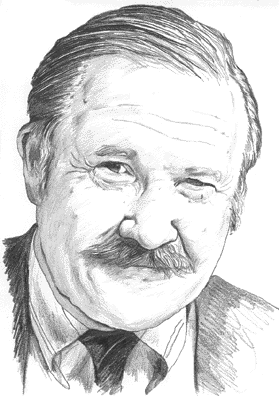INTERVIEW
Trading Success As A Point Of Reference
by Thom Hartle
Ari Kiev started out working with suicidal patients before going on to work with athletes and now as a trader's coach. He is a management consultant to several trading firms and is the author of numerous books, including the recent Trading To Win: The Psychology Of Mastering The Markets. STOCKS & COMMODITIES Editor Thom Hartle interviewed Kiev via telephone on November 24, 1998, asking him about working with traders, his new book and more.

ILLUSTRATION BY CARL GREEN
I argue that profitability isn't dependent on the market. Profitability is dependent on what the traders themselves decide to do. I argue that they trade in terms of the mental concepts that they create for themselves. -- Ari Kiev
You're a practicing psychiatrist who also works as a trader's coach. How did you start working with traders?
I've been a psychiatrist for 35 years. My early experience was in running a suicide prevention clinic. Dealing with that kind of ongoing crisis really required a proactive approach. The patients we saw at the clinic did not need to be hospitalized, but for the most part they had hurt themselves or they were about to be discharged from a hospital. So my role was to help them deal with their circumstances, help them develop the strength they needed to withstand the pressure they were under, and help them devise strategies to better cope with their lives.
Get them out of the situations that led to their hospitalization?
Or at least handle the situations better. Invariably, these were people who were very conscientious and who took on too much responsibility. They were overloaded, but they weren't able to express to others that they were in over their heads -- not unlike traders who end up burning out.
What's an example?
For example, they could be the heads of small firms, but found that they really couldn't handle the pressure that was put on them. Often, they would try to control everything, and they would feel responsible for anything that went wrong. From that experience, I developed some psychotherapeutic approaches for coping with life's challenges.
Such as?
For example, setting goals, trying to tap undeveloped resources, trying to ride out anxiety and stress, and so forth.
Those sound like approaches everyone could benefit from.
True enough. Over a 10- to 15-year period, I could see that my approaches were relevant to dealing with the issues of people who were healthier, not just people in a suicidal crisis. It turned out that some of the same dimensions were appropriate for helping athletes achieve their goals or break through earlier established records.
How's that?
Well, how do you think the unthinkable?
Good question!
Exactly. How do you break through barriers that exist in your mind because they are part of your culture? Some of those same approaches that worked with desperate and depressed suicidal individuals seemed to work well with athletes who, in their own way, were sometimes facing the same sorts of pressures.
How did you get from working in suicide prevention to working with athletes?
Serendipitously. My kids were involved in a training center where we lived, and most of the trainers were Olympic athletes. So I became involved with the Olympic Sports Medicine Committee and ended up as the first psychiatrist on that committee. This was back in the 1970s.
The best traders look to the market for their clues. They're not always right, but they don't see the market as their enemy. -- Ari KievExcerpted from an article originally published in the February 1999 issue of Technical Analysis of STOCKS & COMMODITIES magazine. All rights reserved. © Copyright 1999, Technical Analysis, Inc.